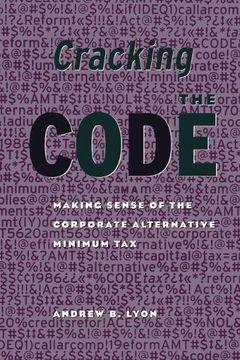Share
Cracking the Code: Making Sense of the Corporate Alternative Minimum tax
Andrew Lyon (Author)
·
Brookings Institution Press
· Paperback
Cracking the Code: Making Sense of the Corporate Alternative Minimum tax - Andrew Lyon
Choose the list to add your product or create one New List
✓ Product added successfully to the Wishlist.
Go to My Wishlists
Origin: U.S.A.
(Import costs included in the price)
It will be shipped from our warehouse between
Friday, June 07 and
Tuesday, June 25.
You will receive it anywhere in United Kingdom between 1 and 3 business days after shipment.
Synopsis "Cracking the Code: Making Sense of the Corporate Alternative Minimum tax"
The corporate alternative minimum tax (AMT) was hailed in the Tax Reform Act of 1986 as instrumental to ensuring that tax loopholes would not permit corporations to avoid paying their fair share of tax liability. In 1995, less than ten years later, repeal of the AMT was pledged as part of the Republican Party's "Contract with America" and passed by the House of Representatives. Opponents of the AMT object that it penalizes new investment by firms and prevents the use of legitimate deductions. Its defenders tout the ability of the AMT to address public perceptions of unfairness in the tax system. At first glance, the debate over the AMT seems to be another example of the classic struggle between equity and efficiency. But, as this book reveals, there are serious flaws in the arguments used on both sides of this issue. As a result, the AMT may fail to achieve any notable equity objectives and may miss the opportunity to make significant improvements in the efficiency with which the nation's scarce capital is employed. Whether or not reforms of the AMT are ultimately enacted, the debate over the AMT raises fundamental questions of tax policy that will persist: Who benefits from tax subsidies? How much should the tax code be used to direct resources in the economy? If corporate taxes are ultimately borne by individuals, how do corporate tax provisions affect fairness? Andrew Lyon opens these topics up to a wide audience, presenting new data on the impact of the AMT, and offering suggestions for future policy reform. He argues that the legislative desire to respond to an apparent inequity should be channeled into considering whether there are efficiency reasons for reducing the tax advantages observed. The best solutions to these considerations, he contends, are not found in a minimum tax.
- 0% (0)
- 0% (0)
- 0% (0)
- 0% (0)
- 0% (0)
All books in our catalog are Original.
The book is written in English.
The binding of this edition is Paperback.
✓ Producto agregado correctamente al carro, Ir a Pagar.

